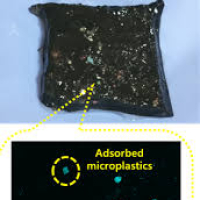IISc Researchers Create Eco-Friendly Hydrogel to Eliminate Microplastics from Water
IISc Researchers Create
Eco-Friendly Hydrogel to Eliminate Microplastics from Water
·
To
combat the worldwide problem of plastic pollution, researchers at the Indian
Institute of Science (IISc) have created a sustainable hydrogel that can be
used to extract microplastics from water.
·
The
health of people is at risk due to the widespread presence of microplastics,
which are tiny particles smaller than five millimeters, in soil, oceans, and
even the air we breathe.
·
By
employing UV light irradiation, the hydrogel—which is composed of a special
polymer network—can bind and break down microplastics.
·
Previous
approaches, such as filtering membranes, are unsustainable since they have
failed because of clogging.
How
did it come to be?
·
The
copper substitute polyoxometalate nanoclusters and three polymer layers that
make up the IISc hydrogel have demonstrated excellent efficacy in eliminating
polyvinyl chloride and polypropylene microplastics from water.
·
According
to IISc, the hydrogel is made up of three distinct polymer layers that are
entwined to form an Interpenetrating Polymer Network (IPN) architecture:
chitosan, polyvinyl alcohol, and polyaniline. The researchers added copper
replacement polyoxometalate (Cu-POM) nanoclusters to this matrix. These
nanoclusters function as catalysts, breaking down the microplastics with the
help of UV light. The polymers and nanoclusters worked together to create a
robust hydrogel that could absorb and break down significant volumes of
microplastics.
·
The
group intends to use larger technology in order to implement devices that
remove microplastics from different types of water. The hydrogel is a versatile
solution to environmental contamination because it can also be used to create
carbon nanoparticles that can remove heavy metals from contaminated water.
Concerning IISc
Located
in Bangalore, the Indian Institute of Science (IISc) was founded in 1909 with
the goal of promoting scientific research in India. Among the top research
institutes in the nation, it provides undergraduate, graduate, and doctorate
degrees in a range of scientific fields. Numerous research facilities and
laboratories are located on the 400-acre complex. IISc is renowned for its
contributions to innovative and cutting-edge science, engineering, and
technology-related research.
Concerning
microplastics
Microplastics
are microscopic plastic particles that contaminate the environment; they are
less than 5 mm. These particles originate from a multitude of sources, such as
industrial operations, textiles, and cosmetics. Because they can be consumed by
animals and make their way up the food chain, they are detrimental to marine
life. Additionally, drinking water has been shown to contain microplastics,
endangering human health. Improving waste management systems and outlawing
specific products are two ways to lessen the pollution caused by microplastics.
